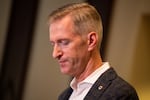
Mayor Ted Wheeler speaks at a press conference Aug. 30, 2020, in Portland, Ore.
Bradley W. Parks / OPB
In the aftermath of a violent political street brawl in Portland, spectators, journalists, and elected officials will occasionally unite around a common question: where were the police?
On August 22, 2020, as armed pro-Trump demonstrators fought for hours with anti-fascist counterprotesters, the police monitored from the sidelines. On the anniversary of that brawl last month, as a roving street fight moved through the city’s Parkrose neighborhood, the police never showed up. Weeks before, on August 8, as two clashing groups hurled paintballs and fireworks at one another blocks from the main police precinct, law enforcement did not intervene.
The tepid police response has led some in Portland to doubt that the bureau is doing everything in its power to respond to emergency calls. An email obtained by OPB shows that skepticism is not limited to protesters - it has reached the highest level at City Hall.
“I do not understand why there was no police response at all,” wrote Portland Mayor Ted Wheeler, who doubles as the city’s police commissioner, to a constituent on August 9, hours after clashing groups brawled openly downtown and a man pointed what appeared to be a rifle at journalists.
“I know the excuse given is that they were deployed elsewhere, but I’m not sure that I buy that,” Wheeler wrote.
In his spare time between meetings and late at night, the mayor, a self-professed light-sleeper, will sometimes fire off frank responses to Portlanders who write to him, revealing stark insights that rarely trickle out during his press conferences. At 12:26 a.m. on August 9, Wheeler fired off one such email.
The constituent, who asked OPB to remain anonymous, told Wheeler she was frustrated over the lack of police response that night.
“I think you’ll be shocked to hear that I agree with you,” the mayor responded. “I will start with the assumption that they did the best they could, but I’m not just going to assume that without further follow up.”
According to the email, the mayor asked Police Chief Chuck Lovell to provide him a “detailed understanding” of how many officers were deployed on August 8 and where they were located, as well as a “clear understanding” of what resources Lovell needs to respond reliably.
“I believe it is very disconcerting to the public that there is an appearance that police will simply not show up,” Wheeler wrote. “If they need my support with additional resources I’m certainly willing to give it, I just need a clear plan for the bureau on what their needs are.”
In an interview with OPB, Wheeler said he was doing his due diligence as the elected official tasked with civilian oversight of the bureau. He said he was ultimately satisfied with the answers provided by Lovell as to why no police intervened that day.
Wheeler said he was told the bureau was responding to multiple emergencies on August 8 and was spread too thin to respond downtown. A spokesperson for the bureau told the media “a significant number of officers” were tied up responding to a homicide and a robbery.
“There are times where police do not have adequate resources to respond to traffic fatalities, homicides and willful combatants all at the same time,” Wheeler said in an interview. “And that’s why I’m asking my colleagues for more resources for the police. We are understaffed. There’s not a question in my mind.”
Wheeler said he was in the process of pitching a “rational staffing plan” for the bureau to his colleagues on the city council, which could include asking this fall for more resources for the bureau.
Protest response
The mayor’s desire to have more police intervention at protests appeared short-lived. Weeks later, Wheeler supported a policing strategy for a large protest on August 22 where he warned the public in advance that police would not intervene.
Wheeler said the two incidents were related.
“What I learned from August 8 was, in fact, we can not guarantee that we will have adequate resources available to respond in substantial force to these kinds of events where what you basically have is adult men dressed as teenage mutant ninja warriors beating the crap out of each other.”
While the mayor originally crowned the law enforcement response to August 22 a success, he later changed course, deeming it “not the right strategy.” The mayor said he changed his appraisal after receiving new information on the level of violence at the event over the course of the following days.
Reports published that day paint the picture of an extremely violent event with the groups brawling openly on Parkrose High School property and gunfire exchanged downtown forcing people to hide behind vehicles.
Despite regular briefings from the police bureau that day, Wheeler said he did not receive the full picture of how combustible the event was for those on the ground.
“I did not have that information,” he said. “I should have been really clear that based on the information I had at the time I was making that statement, it looked to us as though there really wasn’t a lot of violence that spread beyond the people who showed up.”
Asked if he had ever considered replacing the chief, who is ultimately responsible for keeping his boss informed, the mayor declined to answer.
“It’s not an appropriate question for me to answer publicly. I have regular meetings with the Chief,” he said. “The Chief knows that I have his back.”
